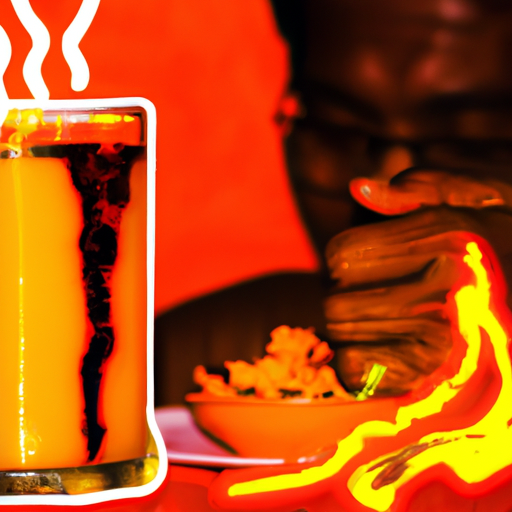Are you tired of your irritable bowel syndrome (IBS) symptoms controlling your life? Well, fret no more, because I have found the perfect solution for you!
Brace yourself, because the best tea to drink with IBS is nothing short of miraculous. This magical concoction has the power to soothe your troubled gut and restore harmony to your digestive system.
Introducing the ultimate elixir for IBS sufferers: a selection of teas that have been scientifically proven to alleviate symptoms and provide relief. These teas, carefully chosen for their exceptional properties, include:
- Peppermint
- Chamomile
- Ginger
- Fennel
- Peppermint and chamomile blend
- Green tea
- Rooibos
Each one of these teas possesses unique qualities that can help ease your IBS symptoms and improve your overall well-being.
In this article, we will explore the benefits of each tea, backed by evidence-based research, and discover how they can make a real difference in your life.
So, sit back, relax, and prepare to embark on a journey towards better digestive health with the best tea for IBS. Trust me, you won’t want to miss out on this sensational discovery!
Key Takeaways
- Peppermint tea and chamomile tea are the best tea options for individuals with IBS, as they both soothe and relax the digestive system.
- Ginger tea and fennel tea are also beneficial for managing IBS symptoms, as they reduce inflammation and improve digestion.
- Green tea and rooibos tea, with their antioxidant properties, are recommended for individuals with IBS to improve gut health and alleviate symptoms.
- It is important to consult with a healthcare provider before trying any new herbal remedies for IBS.
Peppermint Tea
If you’re looking for a soothing and refreshing option to ease your IBS symptoms, look no further than peppermint tea! Peppermint tea has long been recognized for its therapeutic properties and can be a great addition to your daily routine.
One of the best things about peppermint tea is that it can be enjoyed at any time of the day. Whether you prefer a hot cup in the morning to start your day off on the right foot or a chilled glass in the afternoon to cool down, peppermint tea is a versatile choice.
Peppermint tea is known for its ability to alleviate symptoms of IBS, such as bloating and abdominal pain. It works by relaxing the muscles of the gastrointestinal tract, which can help to reduce spasms and discomfort. However, it’s important to note that peppermint tea may not be suitable for everyone. Some individuals may experience side effects such as heartburn or allergic reactions. It’s always a good idea to start with a small amount and monitor your body’s response.
Now, let’s move on to another tea that can provide relief for your IBS symptoms – chamomile tea.
Chamomile Tea
In my experience as a healthcare professional, chamomile tea has proven to be an effective remedy for calming and relaxing the digestive system. Its soothing properties can reduce symptoms such as bloating and cramping, providing relief for individuals with digestive issues like IBS.
Additionally, chamomile tea has been shown to reduce nausea and indigestion, making it a suitable choice for those experiencing these discomforting symptoms.
Overall, chamomile tea is a reliable option for promoting digestive wellness and alleviating related symptoms.
Calms and Relaxes the Digestive System
Feeling stressed? Try sipping on a cup of chamomile tea to calm and relax your digestive system – can’t anything be more soothing?
Chamomile tea is one of the best calming herbal remedies for digestive issues. It’s been used for centuries as a natural remedy to alleviate symptoms such as bloating, gas, and stomach cramps.
The active compounds in chamomile, such as chamazulene and bisabolol, have anti-inflammatory and antispasmodic properties that help reduce irritation and promote relaxation in the digestive tract.
Studies have shown that chamomile tea can also help improve digestion by increasing gastric motility and reducing the risk of acid reflux.
So, if you’re looking for a gentle and effective way to soothe your digestive system, chamomile tea is definitely worth a try. It not only calms and relaxes your digestive system but also reduces nausea and indigestion.
Reduces Nausea and Indigestion
Nothing soothes an upset stomach quite like a warm cup of chamomile tea. With its calming properties, chamomile tea is an excellent choice for reducing nausea and indigestion. The soothing effects of chamomile can help alleviate bloating and ease stomach cramps, providing relief for those suffering from digestive discomfort.
Chamomile tea works by relaxing the muscles in the digestive tract, allowing for smoother digestion and reducing the likelihood of indigestion. Its anti-inflammatory properties also help to soothe any inflammation in the digestive system, further aiding in reducing discomfort.
Moving forward, let’s discuss the benefits of ginger tea in the next section. Ginger tea is known for its ability to alleviate digestive issues and promote overall gut health.
Ginger Tea
Try sipping on some soothing ginger tea to help alleviate your IBS symptoms. Ginger tea has been used for centuries to treat various digestive issues, including nausea and indigestion. It contains compounds that have anti-inflammatory and antioxidant properties, which can help reduce inflammation in the gut and ease digestion.
One of the key benefits of ginger tea is its ability to reduce nausea. It has been found to be particularly effective in relieving morning sickness in pregnant women, and it may also help alleviate the nausea associated with IBS. Ginger tea can also help with indigestion by stimulating the production of digestive enzymes and improving the absorption of nutrients.
To make ginger tea, simply steep a few slices of fresh ginger in hot water for about 10 minutes. You can add a squeeze of lemon juice or a teaspoon of honey for added flavor. It’s important to note that ginger tea may not be suitable for everyone, especially those with a history of gallstones or bleeding disorders. As always, it’s best to consult with your healthcare provider before introducing any new herbal remedies into your routine.
Now, let’s move on to another tea that can be beneficial for IBS symptoms: fennel tea.
Fennel Tea
Fennel tea, with its unique licorice-like flavor, offers a soothing and aromatic option for relieving IBS symptoms. This herbal tea has been recognized for its numerous benefits in improving digestion and alleviating gastrointestinal discomfort.
Fennel tea is rich in volatile oils, including anethole, which has been shown to have anti-inflammatory properties that can help reduce inflammation in the gut. Additionally, fennel tea can help relax the muscles in the digestive tract, providing relief from bloating, cramping, and gas.
To prepare fennel tea, start by crushing one teaspoon of fennel seeds to release their natural oils. Then, add the crushed seeds to a cup of boiling water and let it steep for about 10 minutes. You can strain the tea before drinking it, or you can leave the seeds in for added flavor and benefits. For an extra touch of sweetness, you can add a teaspoon of honey or a squeeze of lemon.
Transitioning to the subsequent section about the ‘peppermint and chamomile blend,’ it’s important to explore other herbal tea options that can provide relief for IBS symptoms.
Peppermint and Chamomile Blend
As an expert in digestive health, I can confidently say that a blend of peppermint and chamomile tea is a fantastic choice for individuals with IBS.
This unique combination combines the benefits of both herbs, providing a soothing and relaxing effect on the digestive system. Peppermint has been shown to help alleviate symptoms such as abdominal pain and bloating, while chamomile is known for its calming properties that can help reduce stress and promote healthy digestion.
Combines the Benefits of Peppermint and Chamomile
Enjoy the soothing blend of peppermint and chamomile, which brings together the best of both worlds and paints a calming picture in your mind. Peppermint tea benefits include relieving symptoms of irritable bowel syndrome (IBS) like abdominal pain, bloating, and gas. It has antispasmodic properties that help relax the muscles in the gastrointestinal tract, reducing spasms and promoting smoother digestion. Chamomile tea benefits, on the other hand, lie in its ability to reduce inflammation and soothe the digestive system. It contains compounds that can help relieve indigestion, nausea, and stomach cramps. By combining these two herbal teas, you can experience a synergistic effect that provides a soothing and relaxing effect on the digestive system. This blend is a natural remedy that can help alleviate IBS symptoms and promote overall gut health.
Provides a Soothing and Relaxing Effect on the Digestive System
Indulge in this soothing blend of peppermint and chamomile tea that’ll bring a calming and relaxing effect to your digestive system. This combination of natural remedies for digestive issues provides a gentle and soothing tea option for those with digestive discomfort. Here are three reasons why this tea is a great choice:
-
Peppermint: Known for its ability to calm the muscles of the gastrointestinal tract, peppermint can help alleviate symptoms like bloating, gas, and stomach cramps.
-
Chamomile: With its anti-inflammatory properties, chamomile can help reduce inflammation in the digestive system, easing symptoms such as indigestion and acid reflux.
-
Relaxing effect: Both peppermint and chamomile have a calming effect on the digestive system, promoting relaxation and relieving stress, which can contribute to digestive issues.
Transitioning to the subsequent section about green tea, another popular tea option for digestive health, let’s explore its benefits.
Green Tea
Green tea is a fantastic option for individuals with IBS due to its numerous health benefits. It contains antioxidants that promote gut health, helping to reduce inflammation and improve digestive function. These antioxidants help to protect the cells lining the digestive tract, supporting overall digestive health.
Contains Antioxidants that Promote Gut Health
Tea that contains antioxidants can be beneficial for promoting gut health, helping you feel better with your IBS symptoms. Antioxidant-rich teas, such as green tea, have been studied for their potential to improve gut health and alleviate IBS symptoms.
Green tea is packed with polyphenols, which are powerful antioxidants that can help reduce inflammation in the gut. These antioxidants have been shown to have a positive impact on gut bacteria, promoting a healthy balance and supporting digestive function.
Additionally, herbal teas like chamomile and peppermint have been traditionally used to soothe digestive discomfort and promote gut health. Incorporating these antioxidant-rich teas into your daily routine may help alleviate IBS symptoms and improve overall digestive function.
Next, we’ll explore how tea helps reduce inflammation and improve digestive function.
Helps Reduce Inflammation and Improve Digestive Function
By incorporating antioxidant-rich herbal teas into your daily routine, you can provide your gut with the nourishment it needs to reduce inflammation and promote digestive wellness.
When it comes to managing IBS symptoms, reducing inflammation and improving digestive function are key goals. Luckily, certain teas can help achieve these goals naturally.
Chamomile tea, for example, has been shown to reduce bloating and soothe the digestive tract. Its anti-inflammatory properties can help calm the gut, making it a popular choice among individuals with IBS.
Peppermint tea is another great option, as it can relax the muscles of the gastrointestinal tract and alleviate symptoms such as abdominal pain and bloating.
Incorporating these natural remedies for IBS into your routine can help improve your digestive health and overall well-being.
Now, let’s explore the benefits of rooibos tea.
Rooibos Tea
If you’re looking for a soothing and caffeine-free option for managing your IBS symptoms, why not try indulging in a warm cup of comforting Rooibos tea? Rooibos tea, also known as red bush tea, is a herbal tea that comes from the leaves of the Aspalathus linearis plant native to South Africa. It has gained popularity for its numerous health benefits and its ability to reduce inflammation and improve digestive function, making it an excellent choice for individuals with IBS.
Rooibos tea is packed with antioxidants, such as aspalathin and nothofagin, which help to reduce inflammation in the body. These antioxidants fight against free radicals, which can cause damage to cells and contribute to inflammation. By reducing inflammation, Rooibos tea can help alleviate symptoms of IBS, such as abdominal pain and bloating.
When it comes to brewing techniques, Rooibos tea is quite versatile. It can be enjoyed hot or cold, depending on your preference. To brew a cup of Rooibos tea, simply steep a tea bag or loose tea leaves in hot water for about 5-7 minutes. You can adjust the brewing time to achieve your desired strength. The longer you steep, the stronger the flavor will be.
Rooibos tea is a fantastic option for individuals with IBS who are looking for a soothing and caffeine-free beverage. Its health benefits, including its ability to reduce inflammation and improve digestive function, make it an ideal choice for managing IBS symptoms. So why not give Rooibos tea a try and experience its comforting effects firsthand?
| Health Benefits | Brewing Techniques | Other Varieties |
|---|---|---|
| Reduces inflammation | Steep a tea bag or loose tea leaves in hot water for 5-7 minutes | Green Rooibos |
| Improves digestive function | Adjust brewing time for desired strength | Honeybush |
| Soothes abdominal pain and bloating | Enjoy hot or cold | Rooibos Chai |
| Packed with antioxidants | Vanilla Rooibos |
Frequently Asked Questions
Can drinking peppermint tea worsen symptoms of acid reflux or heartburn?
Drinking peppermint tea may worsen symptoms of acid reflux or heartburn. However, chamomile tea is a suitable alternative for individuals with ragweed allergies. It’s important to consult with a healthcare professional for personalized advice.
Is it safe to consume chamomile tea if I have an allergy to ragweed?
It is generally safe to consume chamomile tea with a ragweed allergy, as they are from different plant families. However, individuals with severe allergies should exercise caution and consult with a healthcare professional.
How does ginger tea help with digestion and reducing inflammation?
While some may worry about ginger tea causing heartburn, it actually helps with digestion and reduces inflammation. Its benefits include soothing the stomach and promoting healthy gut function. Here’s a simple ginger tea recipe to try: [recipe].
Can fennel tea be effective in relieving bloating and gas?
Fennel tea has been shown to effectively relieve bloating and gas. Its benefits lie in its ability to relax the muscles in the gastrointestinal tract. Here’s a simple fennel tea recipe to try: [recipe].
Are there any potential side effects or interactions to be aware of when drinking a peppermint and chamomile blend tea?
With a peppermint and chamomile blend tea, there are potential side effects and interactions to be aware of. It’s important to consult a healthcare professional to ensure it’s safe for you.
Conclusion
After carefully reviewing the various options, it’s evident that the best tea to drink with IBS is undoubtedly peppermint tea. Its soothing properties and ability to alleviate symptoms make it the ultimate champion for those suffering from this condition.
With its refreshing taste and powerful benefits, peppermint tea is like a magical elixir that brings relief and comfort. So, if you’re looking for a tea that can truly transform your IBS experience, look no further than the remarkable peppermint tea.
Embrace its greatness and bid farewell to your IBS troubles!










